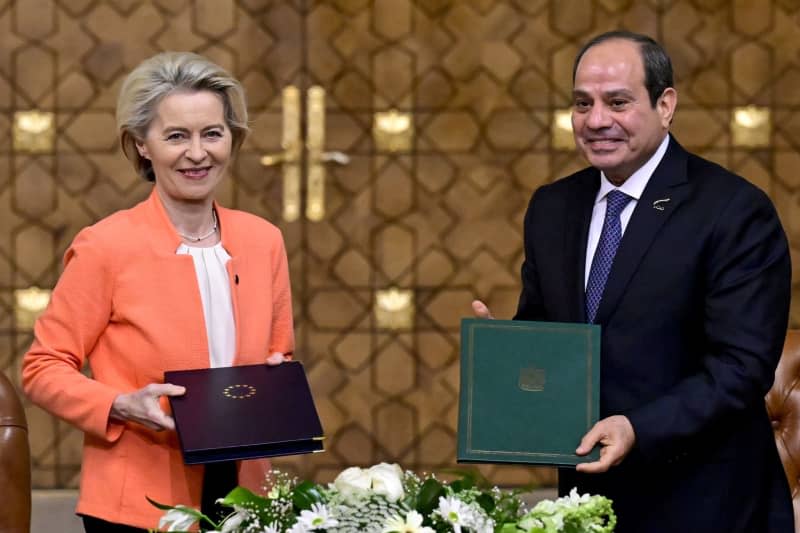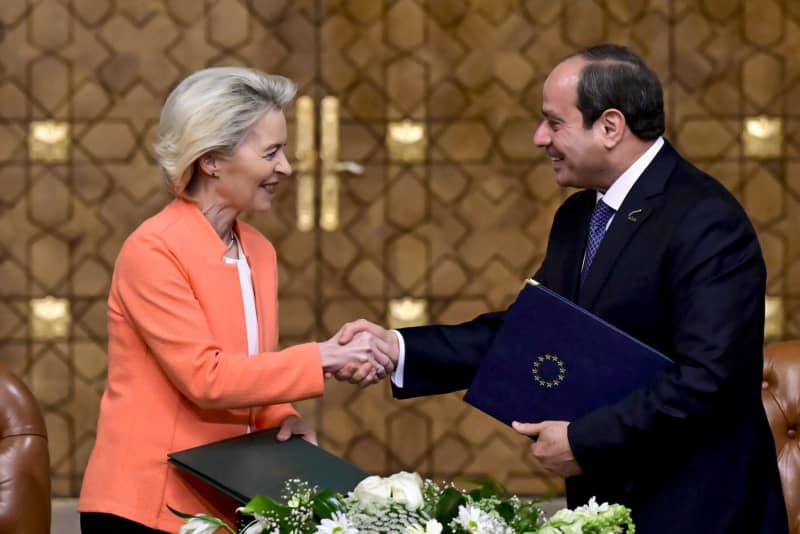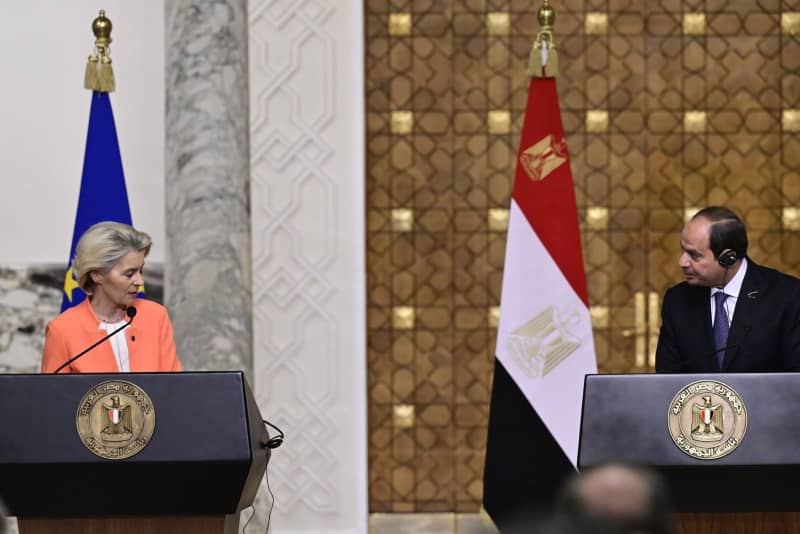EU backs Egypt with €7.4 billion aid package amid migration concerns

- Oops!Something went wrong.Please try again later.
- Oops!Something went wrong.Please try again later.
The European Union on Sunday revealed plans to provide financial aid to Egypt through a combination of loans and grants totalling €7.4 billion ($8.1 billion) until the end of 2027.
This money is intended to be part of a new strategic partnership, as announced by the European Commission during a meeting between EU representatives and Egyptian President Abdel Fattah al-Sissi in Cairo on Sunday.
The cooperation is to focus on stemming irregular migration, as well as economic and political cooperation.
Of the €7.4 billion EU package, €5 billion is earmarked for loans and €1.8 billion for investment in food security and digitalization.
The remaining €600 million will be in the form of subsidies, with €200 million going to manage migration.
In addition to European Commission President Ursula von der Leyen, the EU delegation includes Italian Prime Minister Giorgia Meloni, Belgian Prime Minister Alexander De Croo, Austrian Chancellor Karl Nehammer and Greek Prime Minister Kyriakos Mitsotakis.
In a televised address at the Egypt-EU summit, al-Sissi said partnership is "pivotal" for both sides' joint political, economic and security interests.
Later Sunday, von der Leyen and al-Sissi signed a joint declaration on a strategic and comprehensive partnership between the EU and Egypt. She called it a "new chapter" in Egypt-EU relations.
Von der Leyen has long called for closer cooperation with Egypt, noting in October last year that the country is taking in a growing number of refugees and that the EU has a responsibility to assist.
Egypt had a key role in the region's security and stability, and setting up a strategic and mutually beneficial partnership, should be a priority, she told EU heads of state and government.
There are an estimated 9 million refugees and migrants in Egypt, which has been hard hit by the regional unrest including the war in the neighbouring Gaza Strip.
Egypt has for months been struggling with a severe economic crisis including a foreign currency crunch and soaring inflation.
In an attempt to stabilize economy, the country of around 105 million people earlier this month announced leaving the value of its weak currency to be determined by market forces, resulting in a further devaluation.
The move helped Egypt secure an expanded $8 billion deal with the International Monetary Fund.
The number of migrants currently attempting to cross from Libya, a neighbour of Egypt, to Greece and thus to the EU is increasing.
Greece has expressed concern over increasing arrivals in its waters of Egyptian migrants crossing the Mediterranean to Crete from Tobruk in Libya.
UN authorities have recorded more than 1,000 people arriving in Crete and the nearby island of Gavdos, most of them from Egypt.
Al-Sissi said Sunday his talks with the European leaders dealt with illegal migration aong other issues.
"We have stressed our commitment to combat this phenomenon within the framework of existing cooperation while including the development aspect while addressing it," he said at a press conference with the European officials.
Meanwhile, EU diplomats stress that curbing migration is just one of several aspects in the partnership. Diplomatic sources referred to the need to limit Russian and Chinese influence in Egypt.
They pointed to the construction of a nuclear power plant at El Dabaa to the west of Alexandria by Russia and large investments by China, which ships most of its exports to Europe through the Suez Canal.
German Chancellor Olaf Scholz told dpa that strategic partnerships with third countries such as Egypt are an important building block for the EU's fight against irregular migration: "That is why the EU's agreement with Egypt on this issue is good news."
An earlier EU deal with Tunisia triggered debate and controversy. The deal offered Tunisia millions in financial aid in exchange for taking stronger action against smugglers and illegal crossings.
Refugee advocacy organizations sharply criticized the European Commission over the deal, noting that the Tunisian government has been accused of human rights violations.
Al-Sissi's government in Egypt has likewise faced many allegations of rights abuses. Al-Sissi, an ex-defence chief, led the army's 2013 ouster of Egypt's democratically elected but divisive Islamist president Mohammed Morsi after massive street protests against him.
For its part, Egypt is currently worried about a potential mass exodus of people from the Gaza Strip into its territory due to the ongoing fighting amid a worsening humanitarian situation in the densely populated strip.
At his meeting Sunday with von der Leyen, al-Sissi renewed Egypt's rejection of Palestinians' potential forced displacement to his country, saying Cairo will not allow it, according to the Egyptian presidency
Egypt, the first Arab country to sign a peace treaty with Israel in 1979, is engaged in efforts to mediate a ceasefire and hostage deal between Israel and the Palestinian Islamist Hamas movement.


